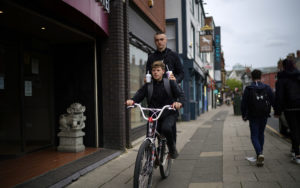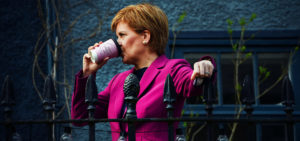For the past 13 years, I have lived on the banks of a wild river that forms part of the Anglo-Scottish border. Liddel Water was once the eastern boundary of the Debatable Land, a 50-square-mile enclave of wooded gorges, rough upland pasture and bogs impassable even to the sheep whose corpses still litter the landscape.
In the late Iron Age, the Debatable Land was a remarkably stable buffer zone between three Celtic tribes. It survived as an independent territory until the mid-16th century, when it became the last part of Great Britain to be brought under the control of a state. In what now seems an impressive act of international cooperation, the Debatable Land was divided equally between Scotland and England. The English deported the most troublesome inhabitants of their half to Ireland; the Scots enlisted a wily local warlord who helpfully hanged, drowned, burned, denuded and dismembered the autarkic groups that made up the local population.
I published a book about this neglected relic of a self-governing British statelet just in time to include the battle for Scottish independence and its aftermath. It gave the normally genteel process of promoting a book a missionary thrill. It also had the strange effect of fictionalising the place I call home. The ideology of nationalism requires a drastic compression and repackaging of the mass of people, geography and history that constitutes a nation. It politicises the very landscape, trivialises local ways of life and promotes ignorance of the country it purports to represent.
As the Manchester-born son of Scottish parents, I knew all about English ignorance of Scotland. Several visitors to our home on the border shared their surprise at discovering that Carlisle is not in Scotland and that Hadrian’s Wall is not the national border. I could understand the Scots’ frustration with oblivious, snooty, Scots-baiting politicians and commentators (the kind who attached sub-racist labels such as “dour”, “canny” and “thrifty” to an entire population). But I was surprised to find similar ignorance in Scotland.
On a rainy night in the spring of 2018, I gave a talk in one of the few council areas of Scotland in which a majority had voted for independence. In the bowels of the Mitchell Library in Glasgow, a red-faced man glowered at me as I spoke. His wife appeared to be egging him on to do something. When the time came for questions, I pointed him out to the chair, and then the pent-up question burst forth: “Where is this “Debatable Land”?”
I began a minute description of its bounds, but this enraged the man even more. “I’m not answering your question, am I?” “Well,” he shouted triumphantly, “I’ve never heard of it! And I was born in Dumfries!”
In normal circumstances, it would have been a mystifying remark. The man had never heard of the land 20 miles from his place of birth which had been a major foreign policy issue for English and Scottish parliaments for more than a century and which appeared to have made a mockery of the very idea of nationhood. Therefore, he denied its existence.
The evidence that Scottish borderers had once belonged to neither nation often evoked intense scepticism, as did the well-established fact that few neighbouring nations in Europe enjoyed such long and mutually profitable periods of stability and peaceful cooperation. The bullish brand of nationalism peddled by Alex Salmond had fostered a state of heroic indignation in which historical truths were a matter of personal choice. It was succinctly expressed on local radio by a nationalist representative of Scottish farming interests. Tired of being proved statistically wrong, he brought the discussion to a sudden end: “Well, I don’t care about arguments anyway. I’m a nationalist, and that’s that!”
Nine days before Nicola Sturgeon unexpectedly resigned as First Minister of Scotland, Salmond accused her, in a tub-thumping Burns Supper speech in Dundee, of undermining 30 years’ of hard campaigning. She had “damaged the independence movement” with “some daft ideology imported from elsewhere”. This was a reference to what Salmond contemptuously called the “self-indulgent nonsense” of her gender recognition reforms. Commenting on Sturgeon’s resignation on The World At One, Salmond adopted a more oleaginous tone. In his view, the First Minister should have “[separated] the case for independence from the day-to-day business of government”. “The articulation of the fundamental case for independence,” complained the deposed leader of the SNP, “has sometimes got muddied and lost in the business of government.’
This is the populist fantasy of a sacred cause existing in stainless purity far above the mess of daily administration. Nationalism had conjured up a culturally coherent race of non-English Britons battling angrily to free itself from the condescending Auld Enemy. The independence campaign had relied heavily on a brazen simplification of Scottish history. Divisions in Scottish society of which many English people are unaware were obscured and erased.
As little as possible was said on the subject of religious sectarianism: the old antagonism of teuchters (Gaelic-speaking Highlanders) and Lowland Sassenachs was rebranded as a conflict of tartan-wearing city-dwellers and “posh” Edinbourgeois. Some campaigners, envisioning independence as the cause of a despised proletariat, argued that southern Scots with a Morningside or a Kelvinside accent were constitutionally English. The nationalist incarnation of Robert the Bruce was unrecognisable as the ambitious Anglo-Norman landowner whose father was born in Essex and who invited two of his combatant English friends to breakfast after the Battle of Bannockburn.
It was oddly exciting to witness the bonfire of facts to which Scottish history was subjected. One fact proved particularly controversial. In the 16th-century, in the Debatable Land and neighbouring parts of England and Scotland, cross-border marriages had been the norm, despite being punishable by death. Contemplating the copious written evidence, but reluctant to accept that interbreeding had been so prevalent, one Scottish academic historian described reports of those marriages as “scaremongering”. A key concept in the nationalist campaign, “scaremongering” means “unfairly rebutting an ideological argument by using brute fact”. Curious to know whether the modern border had interfered with this tradition, I drew a map of these cross-border marriages and showed it to passengers on the 127 bus, which starts in the Scottish village of Newcastleton and ends 24 miles later in the city of Carlisle. Several passengers were able to mention long-married couples to whom the border meant as little as it did to their ancestors.
The 127 bus follows the route of the defunct North British Railway. On Tuesdays and Fridays, it runs along the southern edge of the Debatable Land before plunging down to the river Liddel and the border with England. On the eve of the Scottish Independence Referendum, when polls suggested a narrowing gap between “Yes” and “No”, the mood on the bus was untypically sombre.
Politicians far away in Edinburgh and London were planning to impose changes of some indeterminable but certainly inconvenient nature. They talked about the Border in ignorance of the people who lived and worked on either side of it. Many of them even confused the borderlands with the vast administrative division called “Scottish Borders”, which ends at the outskirts of Edinburgh. In this impoverished, agricultural region, the main concern was the “day-to-day business of government”, as former First Minister Salmond dismissively calls it.
Here, though the accent changes abruptly from one side of the river to the other, nationality is hardly ever mentioned. When the border was closed during the Covid lockdowns, it seemed a ridiculous, arbitrary measure, as though a dream of ages past had solidified in the present. Whenever I mentioned the book I was writing, no one thought it odd that there had once been an independent enclave whose inhabitants considered themselves neither English nor Scottish. Some people thought it “not a bad idea”.
Nationalist ideology struggles to integrate debatable lands like this one. Humza Yousaf has taken charge of a party which has become addicted to its fictions. By introducing its gender recognition reforms in the knowledge that the High Court of Justice would probably quash them (as it did), and deciding to treat the next general election as a “de facto referendum”, it was acting out a fantasy. The best hope for Scottish nationalism now is to separate itself from the cause of independence and to fight for a less lop-sided and unrealistic United Kingdom.
Disclaimer
Some of the posts we share are controversial and we do not necessarily agree with them in the whole extend. Sometimes we agree with the content or part of it but we do not agree with the narration or language. Nevertheless we find them somehow interesting, valuable and/or informative or we share them, because we strongly believe in freedom of speech, free press and journalism. We strongly encourage you to have a critical approach to all the content, do your own research and analysis to build your own opinion.
We would be glad to have your feedback.
Source: UnHerd Read the original article here: https://unherd.com/




